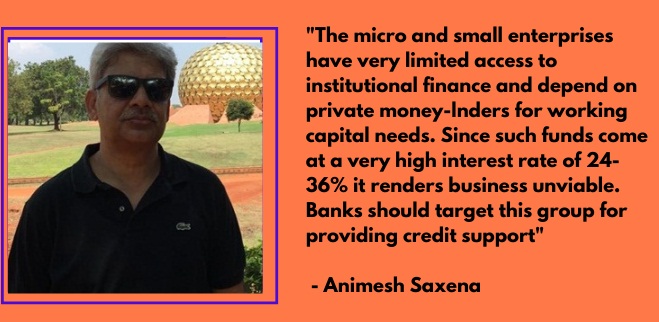Nirbhay Kumar
New Delhi: Claiming that second wave of pandemic has been quite devastating for small businesses and its impact being worse than the first wave last year, top MSME industry captain Animesh Saxena wants the government to direct banks to not attach NPA tag to borrowers slipping on loan repayments.
The RBI has also acknowledged the damage inflicted by second wave on the economy and has cut its real GDP forecast for FY22 to 9.5% from 10.5% estimated earlier.
Federation of Indian Micro and Small & Medium Enterprises (FISME) President Saxena also said that banks should not insist for heavy collateral especially from micro and small enterprises for sanctioning loans. Further, moratorium on loans should be extended by a year or so.
“The micro and small enterprises have very limited access to institutional finance and depend on private money-lenders for working capital needs. Since such funds come at a very high interest rate of 24-36% it renders business unviable. Banks should target this group for providing credit support,” Animesh Saxena told Top Lead India.
Out of around 6.33 crore MSMEs, 99.47% are micro, 0.52% small and 0.01% medium. The micro and small enterprises find it most challenging when a crisis mauls the economy. While banks are averse to lending them, it is the small units which face the longest payment cycle.

Multiple surveys have said that a large number of small units have shut their shops ever since Coronavirus pandemic started taking having toll on trade and business. Faced with low demand, high input costs, subdued consumption and frequent lockdown restrictions, the country’s MSME sector has suffered a body blow.
As MSMEs provide maximum employment, closure of them means massive job loss.
Describing the plight of the sector in the wake of second wave, FISME President Saxena said that he hardly knows any business person who was not affected directly or indirectly. In most families, someone or the other got critical and hospitalised due to the deadly virus infection. In some cases, people even lost lives too.
“This naturally forced people to divert all their energy and effort to saving lives. Business did not remain a priority for people. This severely hit the already struggling businesses. Now, apart from low demand there is significant rise in raw material prices. Given the serious cash flow issues, it is difficult to source raw materials,” said Saxena who is also aleading garment exporter.
In a bid to help the MSMEs stay afloat, RBI Governor Shaktikanta Das on June 4 announced additional measures to boost credit for small businesses.
Accordingly, a Special Liquidity Facility of Rs 16,000 crore would be made available to SIDBI for on-lending/refinancing at repo rate (4%) for a period of up to one year.
A separate liquidity window of Rs 15,000 Crore is being opened till March 31, 2022 with tenures up to three years at the repo rate for contact-intensive sectors.
“Under this scheme, banks can give fresh lending support to hotels, restaurants, travel agents, tour operators, aviation ancillary services and other services including private bus operators, rent-a-car service providers, event organizers, spa clinics, beauty parlours and saloons,” said the RBI.

